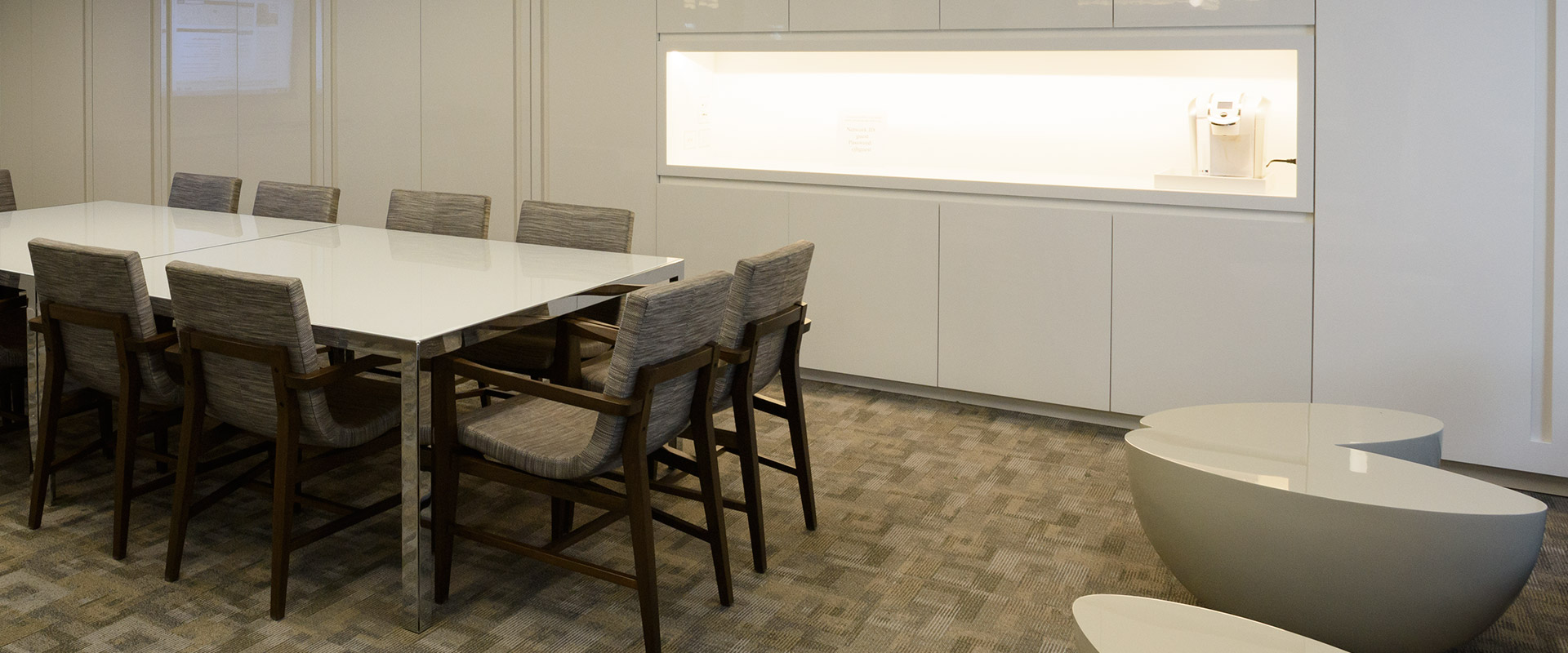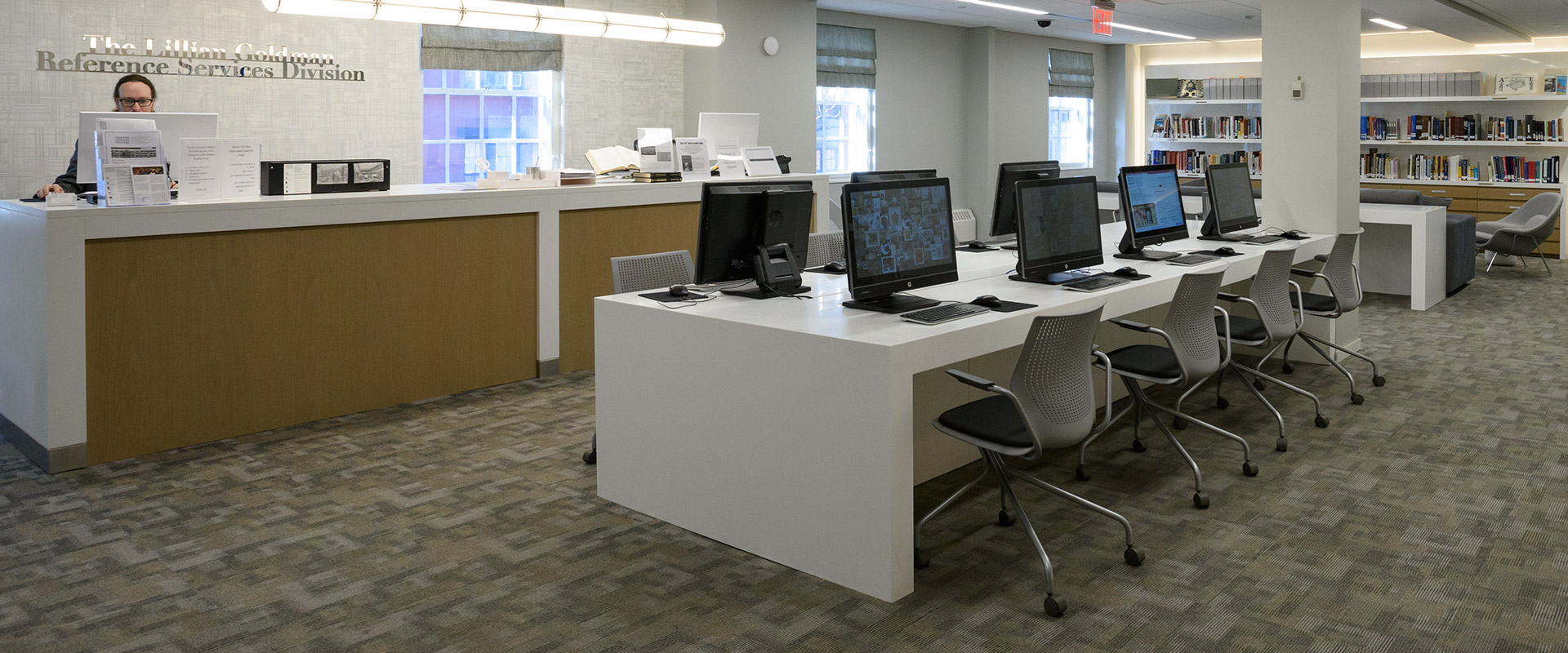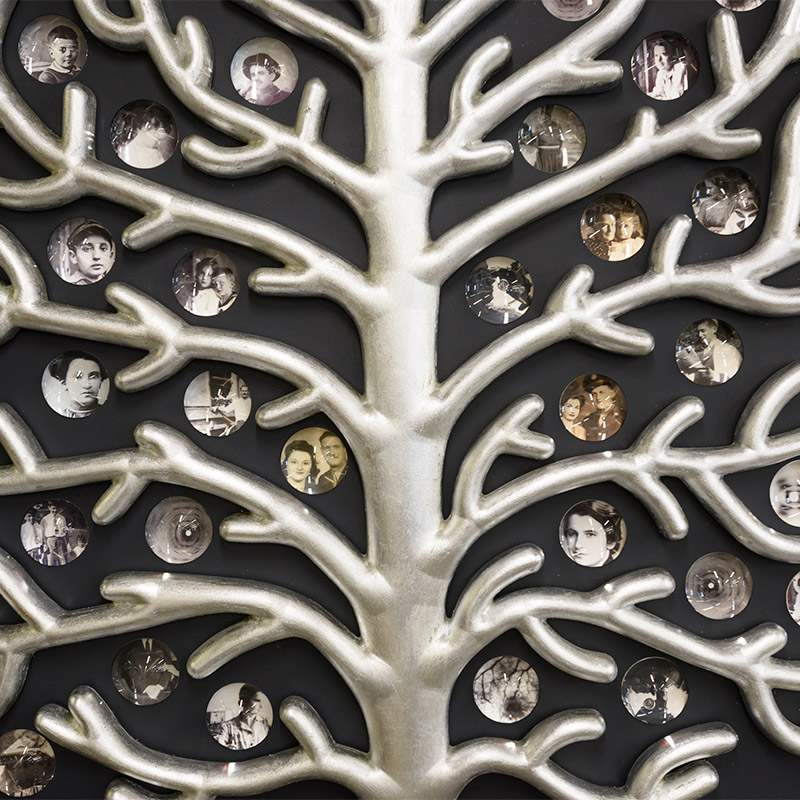The Lillian Goldman Reading Room
The Lillian Goldman Reading Room will reopen with limited capacity on Tuesdays and Thursdays from 10:00 am to 4:00 pm beginning August 10th for researchers who are interested in accessing non-digitized, unique materials held only at the Center for Jewish History. Visits are by appointment only, and reservations can be made through your research account. Appointments must be made at least 14 days in advance and no more than 60 days in advance. (If you are making future travel plans and need to schedule an appointment beyond 60 days, please contact inquiries@cjh.org .)
Masks are required at all times during your visit. If you are not sure whether an onsite visit is necessary for your research interests, please reach out to us! Our librarians are always available at inquiries@cjh.org . We continue to offer remote access to our collections via online inquiries, digitization, and virtual reference sessions.
For tips and information about conducting research at the Center and advice on commonly consulted collections, view the Center's research guides here .
Introduction to the Reading Room
The Center for Jewish History welcomes researchers, scholars and visitors of all backgrounds.
- We are committed to providing a safe, welcoming environment and the broadest possible access to information.
- We are committed to maintaining the privacy of all researchers and readers.
- We do not tolerate disruptive behavior, harassment, or discriminatory action or language.
- We are open to all and open to all points of view in an atmosphere of professionalism and fostering social responsibility.
- In accordance with New York law, federal law and our own policies, we do not limit equal access regardless of race, creed, color, national origin, sexual orientation, gender identity or expression, military status, sex, age, or disability.
- We strive to reflect our community by supporting diversity of people, ideas and expression.
The Lillian Goldman Reading Room, often described as the heart of the Center for Jewish History, is the gateway for exploring the diverse history of the Jewish people through the collections housed at the Center. It was designed to provide modern convenience in a dignified, traditional ambience.
The Reading Room shelves offer reference texts and general information, as well as all major publications of the Center partners: American Jewish Historical Society, American Sephardi Federation, Leo Baeck Institute, Yeshiva University Museum, and YIVO Institute for Jewish Research. Archive and library collections at the Center consist of over 500,000 volumes in multiple languages from many time periods, as well as over 100 million documents, including organizational records and personal papers, photographs, multimedia recordings, posters, art and artifacts. In addition, the Reading Room has developed an extensive electronic resource library.
Professional staff is on hand to provide access to these collections and assist researchers with their work. To speak with a librarian or archivist about your visit to the Lillian Goldman Reading Room, please email inquiries@cjh.org or call (212) 294-8301 extension 5101.
Beginning August 10, 2021: Tuesday and Thursday, 10am-4pm, by appointment only.
Rules & Policies

The Center for Jewish History welcomes you to the Lillian Goldman Reading Room, where you can view the expansive and diverse collections of our five partner institutions. In order to ensure that the items you are handling will be available to future generations of researchers, we ask you to exercise extraordinary care in handling materials and to abide by the following guidelines.
Permitted in the Lillian Goldman Reading Room:
- Paper
- Pencils
- Laptops without the cases
- Digital cameras
- Cell phones in silent mode
Not permitted in the Lillian Goldman Reading Room:
- Coats or jackets
- Food or beverages
- Pens
- Bags, purses, folders, or cases of any kind
- Strollers
A valid picture ID must be presented at the front desk upon entering the building. All coats, backpacks, bags, laptop cases, and suitcases must be deposited at the coat check in the lobby. You will be provided with a clear plastic bag for any personal items. Reference services staff reserve the right to inspect plastic bags upon entry and/or exit, and to restrict entry or access to materials if you cannot comply with these guidelines. Personal books are allowed at the discretion of the reference librarians. If you have a phone, it must be kept on silent or vibrate.
Young children must be supervised at all times by a parent and must be able to understand and obey all rules of the Reading Room. We encourage the use of primary sources for middle and high school students, and they are welcome to use our collections. However, use of any materials is contingent upon being able to provide a photo ID for issuance of a reading room pass. Therefore, middle and high school students who cannot produce a photo ID for admittance will have to use materials with a parent/adult who has appropriate identification.
Research materials may not be removed from the Lillian Goldman Reading Room and must be returned directly to a staff member. Archival boxes will be given to each researcher one at a time. Materials are to be used one folder at a time, keeping the folders flat on the table. The documents must be kept in order within folders, and the folders must be kept in order within the boxes. Researchers may use 2 books or 1 rare book at a time. Certain rare materials require appointments for viewing. Researchers may be required to use white cotton gloves, page turners, or book cradles while handling some items. These special handling considerations are at the discretion of the reference librarians. If microform or digitized copies of research materials are available, these will be provided rather than the originals.
Please note that some collections are subject to restrictions placed on the materials by donors, depositors, or staff.
Photocopying and Digital Photography at Center for Jewish History
The partners of the Center for Jewish History prefer the use of flash-free personal digital photography in lieu of photocopies in order to safeguard the materials. Many archival collections and printed books cannot be photocopied due to fragility, and digital photography is often the only option for reproduction. Therefore, we strongly encourage all readers to bring a camera, tablet, or smartphone in order to take photos. If you do not have a device capable of photography, you may borrow a camera from Reading Room staff. Please note that scanners are not permitted in the Reading Room.
The Center and our partners reserve the right to determine the format of any duplication requests; your copies may be provided as either a paper photocopy or a digital file. This decision will be made based on the condition of the materials and the size of the request, among other factors. Charges will be estimated by staff and provided to you for review and approval before the duplication is initiated.
Duplication services are performed by Center for Jewish History staff only. Requests normally cannot be filled immediately due to high volume.

Restrictions on Materials Copied
- No copying of items deemed "rare materials" by Reading Room staff.
- No fragile or brittle items.
- No bulky or cumbersome materials.
- No more than 1/3 of any publication or manuscript may be copied.
- The copying of some material requires written permission of the Donor or the author of the document. We shall inform you if this is the case.
- Center for Jewish History staff members are the final arbiters of what may be photocopied.
THE COPYRIGHT LAW OF THE UNITED STATES (TITLE 17, U.S. CODE) GOVERNS THE MAKING OF PHOTOCOPIES OR OTHER REPRODUCTIONS OF COPYRIGHTED MATERIAL. UNDER CERTAIN CONDITIONS SPECIFIED IN THE LAW, LIBRARIES AND ARCHIVES ARE AUTHORIZED TO FURNISH A PHOTOCOPY OR OTHER REPRODUCTION. ONE OF THESE SPECIFIED CONDITIONS IS THAT THE PHOTOCOPY OR REPRODUCTION IS NOT TO BE "USED FOR ANY PURPOSE OTHER THAN PRIVATE STUDY, SCHOLARSHIP, OR RESEARCH." IF A USER MAKES A REQUEST FOR, OR LATER USES, A PHOTOCOPY OR REPRODUCTION FOR PURPOSES IN EXCESS OF "FAIR USE," THAT USER MAY BE LIABLE FOR COPYRIGHT INFRINGEMENT. THIS INSTITUTION RESERVES THE RIGHT TO REFUSE TO ACCEPT A COPYING ORDER IF IN ITS JUDGEMENT, FULFILLMENT OF THE ORDER WOULD INVOLVE VIOLATION OF COPYRIGHT LAW.
Basic Rates
- $5 handling fee for first 50 pages, and for each additional 50 pages.
- $0.25 per page for books.
- $0.85-$1 per page for archival materials, dependent on condition of materials and complexity of request.
- Audiovisual materials, photographs/contact sheets/slides, and materials in formats other than paper-based will be assessed on a case-by-case basis.
- Expedited service may be available for an additional charge; please indicate if rush service is desired, so we may calculate these fees in the initial estimate.
Digitization on Demand
The Center offers a digitization on demand service for entire eligible folders and boxes within archival collections as well as out-of-copyright books and periodicals. If you would like to make a request for the scanning or digitization of an item, please register here under “first time users” (or log into your existing account). Select "Photoduplication Request" under the “New Request” tab. For more information, contact inquiries@cjh.org.
Computer Policies

The Center provides computers for visitor use in the Lillian Goldman Reading Room and Genealogy Institute. Use of these computers is limited to:
- Consultation of the Center’s electronic catalogues, databases, and research guides.
- Internet browsing, solely to provide access to sites that are related to your research.
- Email transmissions through your own Internet provider; the Center does not provide email accounts.
Researchers may use their own laptop computers in the Lillian Goldman Reading Room and in the Ackman & Ziff Family Genealogy Institute.
DVD players for use with Center for Jewish History material are available via a laptop from the IT department. Please reserve the laptop 7 days prior to your visit noting that you will be using a DVD. In your request state from which of the partner collections the DVD will be provided. Before reserving, make sure you have clearance for use of the DVD from the partner organization.
Restrictions on Use of the Center's Computers
The Center's computers may not be used in any of these ways:
- Use that violates any federal, state, or local laws, including copyright law and licensing agreements.
- Use that would violate the Center's tax-exempt status.
- Attempting to access, or accessing, any Center intranet files, or downloading software, executable files, databases, or related technology, or any activities that would modify or damage Center equipment, software, or databases.
- Actions that disrupt services for Center staff, volunteers, or users, including but not limited to excessive use of computers when other users are waiting a turn.
Internet Policy
Staff and volunteers may help you access Internet sites, but the Center is not responsible for the accuracy of Internet information.
The Center is a special-purpose institution, committed principally to Jewish studies and genealogical research, and we have a limited number of computers; therefore, visitors should browse only Internet sites related directly to those special purposes.
The Center provides unfiltered Internet access. Users are responsible for accommodating themselves to the consequences of Constitutionally protected communication, even if they might observe or hear objectionable materials while on the Center's premises. We do ask our visitors to be considerate of others regarding any electronic views or sounds that may be disturbing to others.
Parents/legal guardians need to assume responsibility for determining what information resources they want their children to access. The Center assumes that parents/legal guardians have provided guidance to their children about Internet use.
The Center will not release information on the Internet use of any person using a Center computer; however, the Internet is not a secure medium and the Center has no control over the information that others may obtain regarding Internet use.
The Center reserves the right to limit or revoke all computer, Reading Room, and/or Center Genealogy Institute privileges for users who violate Center user policy.
Book Donations
The Lillian Goldman Reading Room and Ackman & Ziff Family Genealogy Institute do not accept donations of books or other collection materials. If you have materials you would like to donate to one of our partner collections, please contact the appropriate partner listed below. All donations are at the sole discretion of the partner; they will only accept donations within the scope of their individual collections.

AJHS collects books related to all aspects of American Jewish History
Please contact Melanie Meyers, mmeyers@cjh.org
American Sephardi Federation (ASF)
ASF collects books relating to Sephardi / Mizrahi History
Please contact info@americansephardi.org
Leo Baeck Institute (LBI)
LBI collects books related to German-Jewish history
Please contact Renate Evers, revers@lbi.cjh.org
YIVO Institute for Jewish Research (YIVO)
YIVO collects books related to Yiddish speaking Jews and Eastern European Jewry
Please contact Stefanie Halpern, shalpern@yivo.cjh.org.